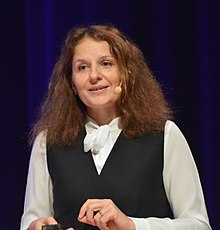Yulia Kovas
Yulia Kovas (born March 12, 1973) is a Russian-British geneticist and psychologist, active in the United Kingdom. She received British Academy Wiley Prize in Psychology in 2012.[1]

Yulia Kovas received bachelor's degrees in literature and language and psychology as well as a master's degree in genetics from St. Petersburg University. She was a teacher in London from 1993–1996 and became a researcher at the Social Genetic and Developmental Psychiatry Center at King's College London from 2003–2005. She became a teacher at Birkbeck College at the University of London in 2005.[2]
She has been Head of the International Center for Research in Human Development at the University of Tomsk in Tomsk, Russia since 2014.[3] She is Professor of Genetics and Psychology at Goldsmiths at the University of London in the United Kingdom.[4][5]
Awards and grants
In 2011 she was awarded the Mega Grant for Leading International Scientists worth £3,000,000 from the Government of the Russian Federation. She has received the Goldsmiths Peake Award, the Wiley Prize in Psychology from the Awards of the British Academy, the APS Janet Taylor Spence Award[6], the D.I. Mendeleev Medal from Tomsk State University and the Russian Academy of Education Award.[4][7]
Selected bibliography[8]
- Yulia Kovas and Philip S. Dale: The Genetic and Environmental Origins of Learning Abilities and Disabilities in the Early School Years, Wiley-Blackwell 2007
- Yulia Kovas, Sergey Malykh and Darya Gaysina: Behavioral Genomics: Child Development And Education, Publishing House of Tomsk State University, Tomsk 2016, ISBN 978-5-94621-585-5
- Yulia Kovas, Sergey Malykh and Darya Gaysina: Behavioral Genetics for Education, Palgrave MacMillan 2016, ISBN 978-1-137-43732-7
- Teemu Toivainen, Giulia Pannini, Kostas A. Papageorgiou, Margherita Malanchini, Kaili Rimfeld, Nicholas Shakeshaft and Yulia Kovas: Prenatal testosterone does not explain sex differences in spatial ability, Scientific Reports volume 8, Article number 13653, 2018 at www.nature.com[9]
References
- "Wiley Prize in Psychology". The British Academy. Retrieved 2020-07-22.
- "Yulia Kovas. Summer school — European Congress of Psychology - 2019". ecp2019.ru. Retrieved 2020-07-22.
- "Path to success: Professor Yulia Kovas talks about the role of genetics in education | TSU Science & Research". en.science.tsu.ru. Retrieved 2020-07-22.
- "Professor Yulia Kovas". Goldsmiths, University of London. Retrieved 2020-07-22.
- "TEDxYouth@Tomsk - Yulia Kovas - Nature-Nurture: How do we know? - YouTube". www.youtube.com. Retrieved 2020-07-22.
- "2013 Janet Taylor Spence Award". Association for Psychological Science - APS. Retrieved 2020-07-22.
- "Team". TAGC - EN. Retrieved 2020-07-22.
- "Yulia Kovas - Google Scholar". scholar.google.com. Retrieved 2020-07-22.
- Malanchini, Margherita; Rimfeld, Kaili; Shakeshaft, Nicholas G.; McMillan, Andrew; Schofield, Kerry L.; Rodic, Maja; Rossi, Valerio; Kovas, Yulia; Dale, Philip S.; Tucker-Drob, Elliot M.; Plomin, Robert (2020-07-02). "Evidence for a unitary structure of spatial cognition beyond general intelligence". npj Science of Learning. 5 (1): 1–13. doi:10.1038/s41539-020-0067-8. ISSN 2056-7936.